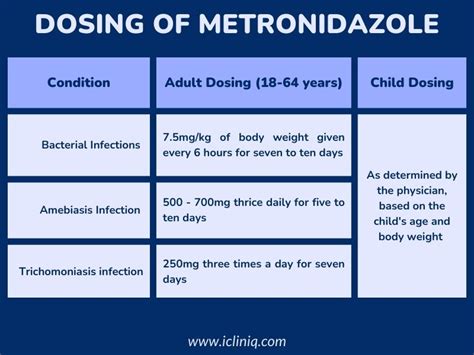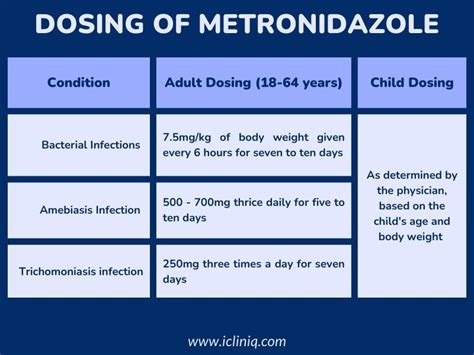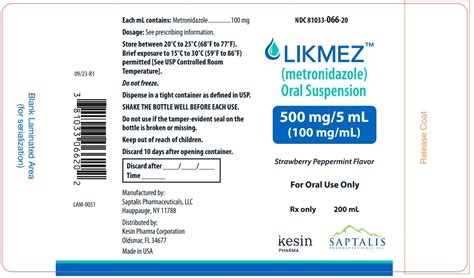Intro
Discover Metronidazole 500mg Tablet Uses for treating bacterial vaginosis, amoebiasis, and giardiasis, with antibiotic and antiprotozoal properties, relieving infections and promoting recovery.
Metronidazole, a medication that has been widely used for decades, is a crucial component in the treatment of various infections. The 500mg tablet form of this drug is one of the most commonly prescribed dosages, and its uses are diverse and significant. In this article, we will delve into the world of metronidazole, exploring its mechanism of action, benefits, and the conditions it is used to treat.
Metronidazole belongs to a class of antibiotics known as nitroimidazoles. It works by entering the cells of microorganisms and damaging their DNA, thereby preventing them from reproducing and ultimately leading to their death. This mechanism is effective against a wide range of pathogens, including bacteria and protozoa. The drug is particularly useful in treating infections caused by anaerobic bacteria, which are bacteria that thrive in environments without oxygen.
One of the primary uses of metronidazole 500mg tablets is in the treatment of bacterial vaginosis, a condition characterized by an imbalance of the normal vaginal flora. This imbalance leads to symptoms such as abnormal vaginal discharge, odor, and sometimes irritation. Metronidazole is highly effective in restoring the natural balance of bacteria in the vagina, thereby alleviating these symptoms. It is often prescribed as a single dose or a short course of treatment, depending on the severity of the condition.
Metronidazole for Infections

In addition to bacterial vaginosis, metronidazole 500mg tablets are used to treat a variety of other infections. These include pelvic inflammatory disease (PID), a condition where the female reproductive organs become infected; amoebiasis, an infection caused by the amoeba Entamoeba histolytica; and giardiasis, an intestinal infection caused by the protozoan parasite Giardia lamblia. The drug is also effective against infections of the skin, bone, and nervous system, among others.
Benefits of Metronidazole
The benefits of metronidazole are numerous. It is a broad-spectrum antibiotic, meaning it can target a wide range of pathogens. This makes it a versatile drug that can be used in various clinical settings. Additionally, metronidazole is generally well-tolerated, with common side effects being mild and temporary, such as nausea, vomiting, and metallic taste. The drug is also relatively inexpensive compared to other antibiotics, making it accessible to a broader population.Working Mechanism of Metronidazole

To understand how metronidazole works, it's essential to look at its pharmacokinetics and pharmacodynamics. The drug is absorbed quickly into the bloodstream after oral administration and is distributed to all parts of the body. It then enters the cells of microorganisms, where it undergoes a process called reduction. This reduction reaction is crucial as it converts metronidazole into its active form, which then damages the DNA of the microorganisms, leading to their death.
Steps for Taking Metronidazole
When taking metronidazole 500mg tablets, it's crucial to follow the prescribed dosage and treatment duration. Here are some steps to ensure effective treatment: - Take the tablets with food to minimize gastrointestinal side effects. - Drink plenty of water to stay hydrated. - Avoid consuming alcohol during treatment, as it can worsen side effects. - Complete the full course of treatment, even if symptoms improve before finishing the medication.Practical Examples and Statistical Data

Numerous studies have demonstrated the efficacy of metronidazole in treating various infections. For example, in the treatment of bacterial vaginosis, metronidazole has been shown to have a cure rate of approximately 80-90%. Similarly, in the treatment of amoebiasis, the drug has been found to be effective in over 90% of cases. These statistics underscore the importance of metronidazole in modern medicine.
Common Side Effects
While metronidazole is generally well-tolerated, there are some common side effects to be aware of. These include: - Nausea and vomiting - Diarrhea - Abdominal pain - Metallic taste - Headache - DizzinessSEO Optimization for Metronidazole

To ensure that information about metronidazole reaches those who need it, SEO optimization is crucial. Using relevant keywords such as "metronidazole 500mg tablet uses," "metronidazole for infections," and "benefits of metronidazole" can improve the visibility of articles and websites discussing this medication. Additionally, incorporating long-tail keywords related to specific conditions treated by metronidazole can further enhance SEO relevance.
Encouraging Engagement
As we conclude our discussion on metronidazole 500mg tablets, it's essential to encourage engagement and further exploration of this topic. Whether you're a healthcare professional, a patient, or simply someone interested in learning more about antibiotics, we invite you to share your thoughts, experiences, or questions in the comments below. Sharing this article with others who might find it informative can also help spread awareness about the uses and benefits of metronidazole.Frequently Asked Questions

What is metronidazole used for?
+Metronidazole is used to treat various infections, including bacterial vaginosis, pelvic inflammatory disease, amoebiasis, and giardiasis, among others.
How does metronidazole work?
+Metronidazole works by entering the cells of microorganisms and damaging their DNA, thereby preventing them from reproducing and leading to their death.
What are the common side effects of metronidazole?
+Common side effects include nausea, vomiting, diarrhea, abdominal pain, metallic taste, headache, and dizziness.
In conclusion, metronidazole 500mg tablets are a vital medication in the treatment of various infections. Their effectiveness, combined with their relatively low cost and broad spectrum of activity, makes them a cornerstone in modern medicine. As we continue to navigate the complex world of antibiotics and infectious diseases, understanding the uses, benefits, and mechanisms of drugs like metronidazole is crucial for improving patient outcomes and combating antibiotic resistance.
